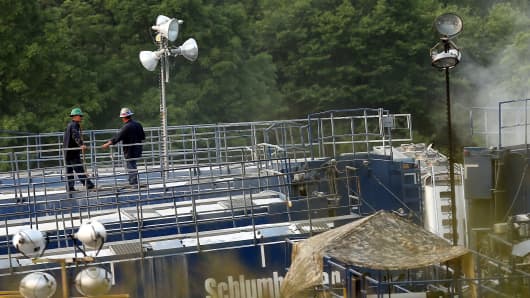Despite objections, the U.S. is heading down the road to export natural gas, and that could ultimately help shake up world energy markets.
The boom in U.S. natural gas, thanks to new drilling technologies has resulted in a record amount of recoverable gas at cheap prices. Selling some of it abroad would bolster U.S. exports, help trade imbalances and relations, and provide fuel to parts of the world where it is now scarce and expensive.
But there are concerns that the shipments out of the country will mean higher prices in the U.S. which has enjoyed extremely low prices recently. Natural gas futures on the NYMEX have been trading at about $3.50 per million BTUs. Natural gas is much more expensive in other parts of the world, especially Asia where the price is oil-linked.
(Read More: US Oil Has Had Renaissance Since Last Dow Record)
Japan is one country hungry for U.S. liquified natural gas (LNG), since the Fukushima earthquake forced Japan to increase high-priced natural gas imports, with its nuclear power industry off line. Japan pays about five times more for natural gas than the U.S.
"This situation is not sustainable for the Japanese economy. In order to change one thought is to further diversify energy sources including shale gas from North America or other frontiers, such as Africa, which has different prices than oil-linked mechanism," said Hirobumi Kawano, president Japan Oil Gas and Metals National Corp.
Kawano was speaking at the IHS CERAWeek energy conference in Houston, where LNG exports was a hot topic.



